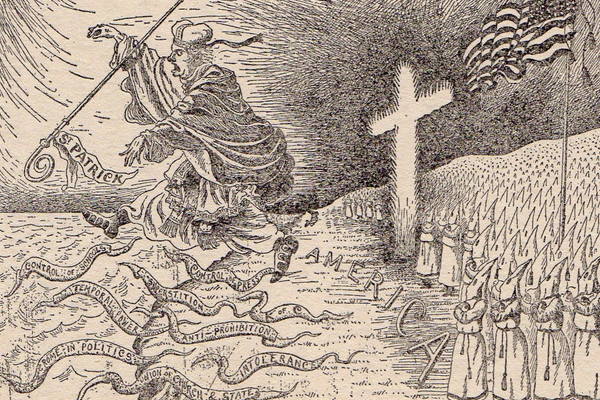Sadly, Hatred is Very Much American

The anti-hate movement that is rightfully sweeping across America, spurred by unprovoked, violent assaults on Asian-Americans, including the murder of six women in Atlanta, often brands ethnic bigotry as "un-American," but ignores an historical reality: Americans have frequently encouraged hate as an emotion designed to further a political agenda, whether in war or to preserve the nation as a white man's country.
There has nearly always been a place for hate in America, provided it is widespread. When, as now, it's not the attitude of the majority, hate may be loudly condemned.
Americans have found what they consider legitimate grounds for hate since the colonial era. "Indians" were always the enemy. Redcoats and Tories of the 1770s were the equivalent of "Japs" and "Wops" of the early 1940s. Pejorative slurs, conveying a hatred of certain nationalities or ideological groups, have been a fixture of American life for centuries.
"No Irish wanted here" was not a tongue-in-cheek sign. It meant what it said.
"Love thy neighbor" had its limits when it came to different ethnicities at various times. While the Irish were the butt of American hatred in the first half of the nineteenth century, they gave way to the Chinese, especially in California, in mid-century. As 1900 approached, the hatred was turned against most immigrants, especially from southern and eastern Europe, fostering a full-fledged xenophobic movement. In the 1930s, here in California, it was the "Okies" who were the object of our hatred, to the point of trying to stop their migration at the Arizona border.
In wartime, hate has been an essential rallying cry among Americans. Whether in North or South, the Civil War required an emotion of hate to justify the slaughter of hundreds of thousands of fellow Americans.
Hate was an instrument of war in both World Wars, especially the second one. In 1941, Japanese Americans were the object of our hate, so much so that one of the arguments for relocation was to protect them from white Americans.
Hollywood depicted enemy German and Japanese soldiers as heartless in films made during World War II, but when the war ended we discovered the German soldier was human, as depicted in "Young Lions." It took longer to humanize Japanese troops, but that came with Clint Eastwood's "Letters from Iwo Jima."
On occasion, such as now, there is an ideological basis for hatred.
A groundswell of anti-foreign hatred on the right is evident in more than the anti-Asian assaults provoked by blaming China for the Covid pandemic. It also has an anti-Hispanic element, seen in the call for a much more formidable wall at our southern border and in the fear of an invasion of Latinos following the inauguration of President Joe Biden. The "crisis at the border" is not just a humanitarian concern. Those on the right who offer that argument also hate the potential “mongrelization” of white America.
They justify their hatred of illegal immigrants on various grounds, such as the fear that illegals will give more congressional seats to Democrats and will, eventually, become voters, swinging red states to blue ones. The anti-immigrant crowd doesn't believe that their hatred of the unchecked flood of immigration is a bad thing.
There is also hatred from the left.
That was evident among some of the anti-Vietnam War protesters of the 1960s and '70s. In some cases, they expressed their hatred by taunting troops returning from the war, and burned and bombed the hated symbols of American imperialism - banks, government offices, even college buildings.
A decade ago, the Occupy Movement expressed its hatred of the rich and powerful by taking over part of Wall Street. The siege of Portland, Oregon, in 2018 and the destruction of public and private buildings there, whether by anarchists or other ideological leftists, was fueled by a hatred of capitalism.
Hate has nearly always had a place in America. At the moment it is out, but when a resurgence of the Covid virus or the possibility of nuclear war dominates our thinking, hate will once again be in.
Lieutenant Cable, and Oscar Hammerstein, had it wrong in "South Pacific." Americans don't have to be "carefully taught " to hate. Historically, it's been inherent, one generation after another. The only change has been the target.